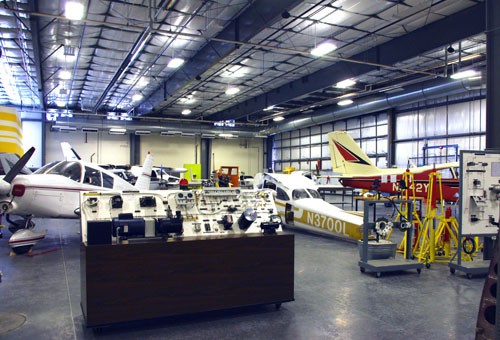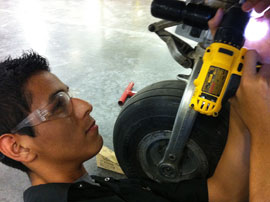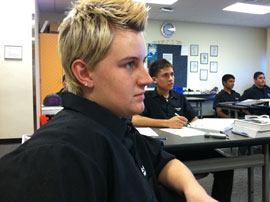Cronkite News has moved to a new home at cronkitenews.azpbs.org. Use this site to search archives from 2011 to May 2015. You can search the new site for current stories.
Vocational program prepares future aircraft mechanics for takeoff
GLENDALE – On any given day, Carlos Rodriguez could be up to his elbows fixing an airplane engine, welding sheet metal or checking hydraulics on plane wheels.
It’s not unusual work for an airplane technician, but then again, most mechanics aren’t worried about getting a date for the homecoming dance.
Rodriguez, a senior at Sierra Linda High School in Tolleson, is one of 86 students in the aviation technology program at the Western Maricopa Education Center (West-MEC).
The program, in its second year, provides students with the 1,944 hours required by the Federal Aviation Administration to take the agency’s airframe and powerplant certification test. In other words, participants could become aviation mechanics right after high school graduation.
“It’s an extraordinary program,” Rodriguez said. “Like, who says they fix airplanes after school? Not so many.”
Students spend the mornings in their home high schools, then head here for five hours each afternoon. That stretches to eight hours a day during June.
Jonna Gile, one of four girls in the aviation program, said she has a mechanical background, likes to fix things and doesn’t mind getting her hands dirty, so planes seemed a good fit.
“My counselor interested me in it,” she said. “It seemed like a good career with good pay and something fairly easy to do.”
The program’s director, Tony Gabaldon, worked on F-15s at Luke Air Force Base for four years and then retired after 22 years at US Airways.
“The thing I love the most is the opportunity. I don’t think a lot of kids understand what they have here,” Gabaldon said. “To go to a school privately, they would have to pay $30,000, but they’re doing this program for $500.”
Students are learning skills for jobs that are in demand, Gabaldon said. He estimated that there are 350 openings for mechanics each month in the Phoenix metro area alone.
Across the state, similar vocational-training districts provide students with technical skills, aiming to get them into the workforce.
West-MEC, which works with 12 school districts in the West Valley, also offers hands-on instruction to students interested in becoming cosmetologists, emergency medical technicians or dental assistants. Students can also take courses in automotive collision, fire science or diesel technology.
Glendale Chamber of Commerce President Don Rinehart said he is enthusiastic about the Aviation Technology program, calling it wonderful for the city.
“We always hear that we don’t have the highly trained people we need, so it’s a real benefit to have different types of agencies and educational facilities that train people for these jobs,” Rinehart said. “It’s meeting a real need.”
Despite job security and pay that can range from $10 an hour at a small airport to $42 an hour for a mechanic with experience, the biggest draw for students may be something else.
“Airplanes are cool,” Gabaldon said.
Instructor Ron DeCandia said he doesn’t expect any less from his teenage students than he would adults.
“It doesn’t matter what age they are. They are eligible to learn,” he said.
Students cannot wear baseball hats for safety reasons. They have to wear a West-MEC shirt or black T-shirt every day.
“It is a tremendous opportunity for a young person who wants to enter this field,” said Cliff Migal, West-MEC’s assistant to the superintendent. “And the transferability of skills, such as electronics, sheet metal and hydraulics offers many, many trade areas.”
Jonna Gile, for instance, plans to earn a business degree and take over her parents’ bike and lawn shop. Carlos Rodriguez dreams of attending Embry-Riddle Aeronautical University and becoming an engineer.
“He can do it. He gets it,” Gabaldon said. “But all the kids deserve ‘attaboys.’ They’re so dedicated to this.”
Last year, Rodriguez took two buses to get to the hangar. This year, a first-year student gives him a ride. Rodriguez comes on Saturdays, for fun.
“I never knew I could actually work on airplanes,” he said. “I saw this opportunity and I thought how amazing it would be, and here I am working on airplanes.”










